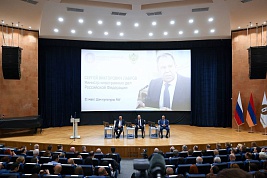Foreign Minister Sergey Lavrov’s remarks and answers to media questions following his visit to the People’s Democratic Republic of Algeria, Algiers, May 10, 2022
Ladies and gentlemen,
I would like to express once again my sincere gratitude to President of Algeria Abdelmadjid Tebboune, Foreign Minister Ramtane Lamamra, and all our Algerian friends for their traditional hospitality and wonderful organisation of our work.
Our countries have longstanding, good, friendly relations, which will be 60 years old this year. This practically coincides withthe date of Algeria’s independence.
To promote our ties in terms of both political dialogue and trade, economic, military-technical, cultural, and humanitarian cooperation, we have reiterated an invitation to President of Algeria Abdelmadjid Tebboune on behalf of President of Russia Vladimir Putin to pay an official visit to the Russian Federation.
The basic document in our bilateral relations is the Declaration of Strategic Partnership of 2021. We have reaffirmed our shared interest in drafting a new interstate strategic instrument, which will reflect the emergence of our collaboration on a qualitatively new level.
We have expressed satisfaction with the fact that despite the COVID-19 pandemic, our trade grew in 2021, exceeding $3 billion. There are good prospects for continuing this trend. Many Russian companies are interested in implementing joint projects with Algerian partners in energy, mineral resources, geological exploration, and pharmaceuticals. The participants in the regular meeting of the Combined Intergovernmental Russian-Algerian Commission on Trade, Economic, Scientific and Technological Cooperation to be held in Algeria within the next few months will focus on these matters.
We have discussed further development of our military-technical cooperation, which has firm roots and good prospects. The Russian Federation appreciates the trust our Algerian friends are putting in us in the matter of strengthening Algeria’s defence capability.
We have coordinated further steps in expanding interaction in the humanitarian sphere, cultural exchanges, and education. We continue to increase the number of scholarship grants extended to Algeria for studies in the Russian Federation.
We have discussed the international situation and coordination of our actions on the key problems of our day and age, including at the UN and such venues as the Gas Exporting Countries Forum (GECF) and OPEC+.
It is of fundamental importance that Russia and Algeria are members of the recently created Group of Friends in Defence of the Charter of the United Nations. There are good prospects for the Group to intensify its activities. We talked about the principle of sovereign equality of states enshrined in the UN Charter. For Russia, Algeria and the majority of other countries, this principle has key significance, but it is consistently disregarded by the United States and its allies.
We have provided to our Algerian friends detailed information on the progress of the special military operation which the Russian Federation, along with the Donbas militias, is conducting in Ukraine.
We appreciate the objective and balanced approach to the Ukrainian issue upheld by Algeria at international organisations and in its foreign policy.
Question: How does Moscow feel about Algeria's offer to act as an intermediary between Russia and Ukraine? And how do you assess Algeria's position on gas supplies and such international issues as Mali?
Sergey Lavrov: As for Algeria's position on the Ukrainian issue, I have already commented on it. I particularly noted our Algerian friends' understanding of the whole complex of problems that have to do with the current situation on Ukrainian territory.
Algeria is a member of the contact group of the League of Arab States (LAS), which recently visited the Russian Federation; after that theymet with the Ukrainian Foreign Minister. Our Arab friends were guided by the decisions taken within the framework of the LAS at a ministerial level, which we consider unbiased and useful.
We are convinced of the need to assist all parties in Mali in establishing an inclusive political dialogue to restore national harmony. We believe that the 2015 Algiers Peace Agreement is a good basis for this. We consider it counterproductive to address Mali's problems by imposing sanctions on the current leadership.
On the supply of gas to the world market. Algeria, Russia and other participants of the Gas Exporting Countries Forum are adhering to the agreements that we reached. I am sure it will continue to be so.
Question: What do you think of Josep Borrell's initiative to give Ukraine frozen Russian assets as “reparations?” Can we say that the masks have come off and the West is moving on to open robbery?
Sergey Lavrov: You could say it is theft, which they are not trying to hide.
This is becoming a habit for the West: they have frozen the money in the United States that belongs to Afghanistan (its Central Bank). They don’t intend to use it for the needs of Afghanistan's citizens who have suffered from the consequences of NATO’s 20-year presence, but for some other purposes not related to the economic reconstruction of Afghanistan.
It is not only this statement and ideas about confiscation of other parties’ property that Josep Borrell is known for. Not so long ago, he said that the Ukrainian crisis must be resolved exclusively by military means. He would do well to remember what his job title is. He is the chief diplomat, not a military leader in the EU.
We may soon see the post of the EU chief diplomat abolished because the EU has virtually no foreign policy of its own andacts entirely in solidarity with the approaches imposed by the United States.
We will consistently oppose any attempts to establish a unipolar world order and destroy the principles used to found the UN.
